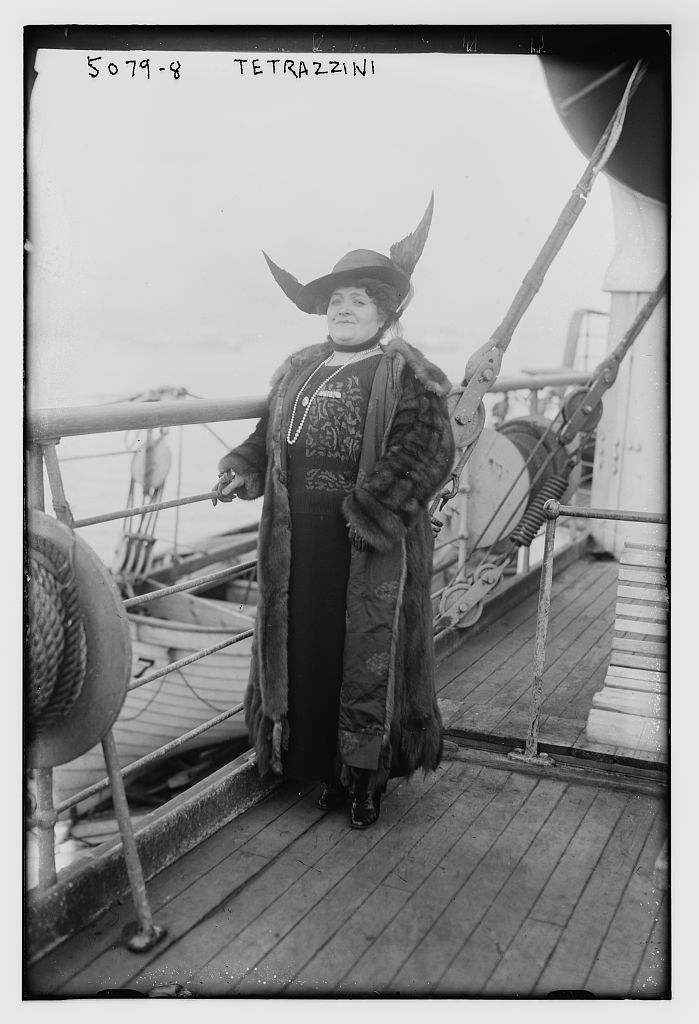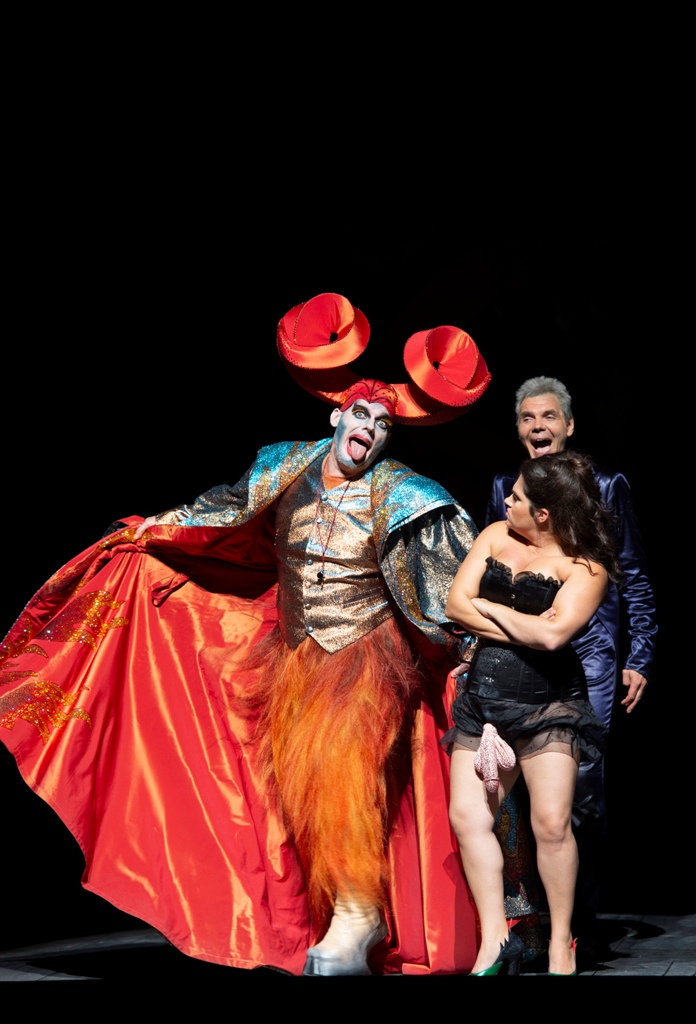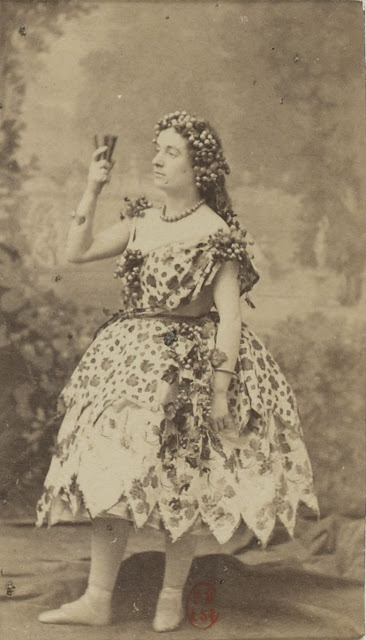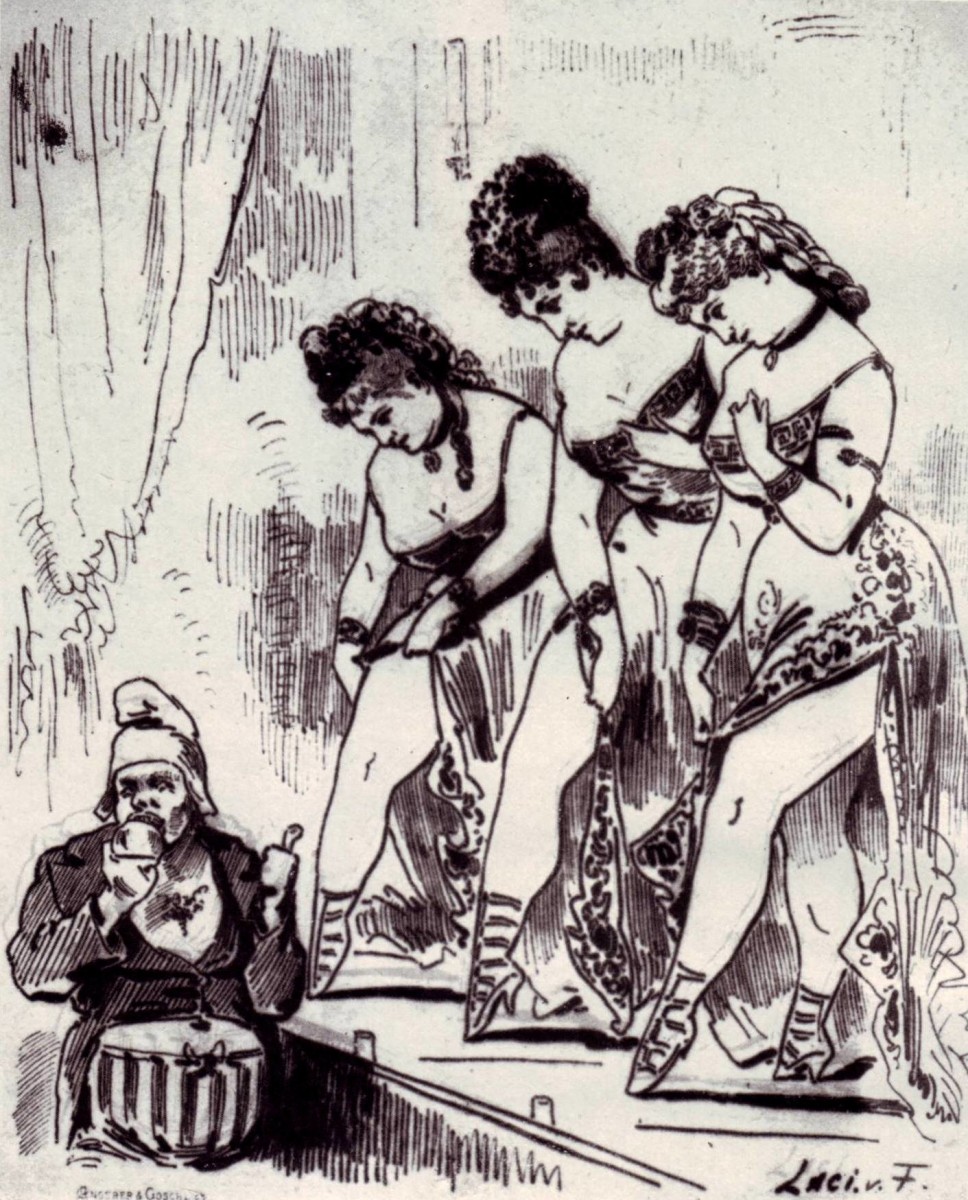Kevin Clarke
Operetta Research Center
2 September, 2019
In his novel Where Angels Fear to Tread, published in 1905, E. M. Forster describes a performance of Lucia di Lammermoor in Italy at the turn of the century. When the local prima donna comes on and starts to sing, Forster says about her: “She was stout and ugly; but her voice was still beautiful, and as she sang the theatre murmured like a hive of happy bees.” The fictional soprano was modeled after real-life superstar Luisa Tetrazzini (1871-1940) whom Mr. Forster had heard in Firenze. Victor Herbert immortalized her for the operetta world with his song “Art Is Calling for Me.” Did Miss Tetrazzini call out Mr. Forster for his unflattering description of her? Maybe she would have done so if she were alive today and had a Twitter account, like operetta prima donna and fellow coloratura soprano Kathryn Lewek. Her recent accusation that’s gone viral is: #bodyshaming by a #nastycritic. (Don’t forget the hash tags.)

The glorious Luisa Tetrazzini in 1920. (Photo: Wikipedia)
You’ll recall that Miss Lewek sang the role of Eurydice in the Salzburg Festival production of Offenbach’s Orphée aux enfers, directed by Barrie Kosky. It’s exactly this production that caused the controversy. German music critic Manuel Brug wrote in an article for Die Welt that sadly Mr. Kosky’s “well oiled Muppet show soon runs dry because, again and again, fat women in tight corsages spread their legs in various private rooms.” (In the original: “Und leider läuft der gut geölte Marionetten-Mechanismus schnell leer, immer wieder machen dicke Frauen in engen Korsetten in diversen Separees die Beine breit.“)

The act one duet between Eudydice and Orpheus, sung by Kathryn Lewek and Joel Prieto, with Max Hopp (left) watching and waiting. (Photo: SF/Monika Rittershaus)
What you need to know here is that the word “dick” is not really negative, unlike “fett,” which literally translates as the prerogative “fat.” “Dick,” on the other hand, is more like “big” or “voluptuous.”
But whatever the best nuanced translation might be, Miss Lewek (not mentioned in the article by name as the “fat/big” one) sent out a call for action on Twitter that read: “HELP! Please help me spread the word. Opera singers are often the targets of #harassment, #bodyshaming & #fatshaming from #operacritics. This must stop. #timesup on these juvenile bullies. Please share and join the discussion. Spread the word! #shameoncritics.”
HELP! Please help me spread the word. Opera singers are often the targets of #harassment, #bodyshaming & #fatshaming from #operacritics. This must stop. #timesup on on these juvenile bullies. Please share and join the discussion. Spread the word! #shameoncritics /thread pic.twitter.com/iJhvsS7jfY
— KATHRYN LEWEK (@KathrynLewek) August 26, 2019
This tweet went viral in the English speaking world, where quickly articles appeared in The Guardian and on the BBC, debates on Twitter and other social media erupted, too. Not just that, the president of the Salzburg Festival, Dr. Helga Rabl-Stadler, released an official statement on body shaming as well. (We’ll get to that in a moment.)
Miss Lewek, as a social justice warrior, has obviously found a hot topic that strikes a nerve with many. She tweeted, as encouragement to others: “CAN I HEAR SOME NOISE from all singers/performers out there who are ‘too sensitive’, and want to see a change in how critics talk about our bodies on stage? SHARE YOUR STORIES PEOPLE!”
On Monday, Manuel Brug published an in-depth reply to all these accusations, asking whether “dick” as in “voluptuous” or “big” is a four letter word, and whether a critic should describe the figure of a singer, especially if she runs around in a tight corset (and little else) during the entire performance, highlighting her body features. (Which Mr. Brug’s article mentions as positive.)
For a bit of historical background, he states: “In the opera world there was a fierce discussion some years ago about soprano Deborah Voigt; she wasn’t deemed suitable to sing at the Royal Opera Hourse in a little black dress in a revival of Ariadne auf Naxos by stage director Christof Loy. The company cancelled her contract. Miss Voigt had her stomach reduced [to lose weight]; she then lost her voice far too early.”
The other example given by Mr. Brug is that of Irish mezzo soprano Tara Erraught. When she appread as Octavian in Rosenkavalier at the Glyndebourne Festival a critic negatively commented on her figure in pants. Without Miss Erraught responding herself to this comment, a huge media debate started.

Marcel Beekman as Aristée/Pluton (left) with Kathryn Lewek and Max Hopp in “Orpée aux enfers” at the Salzburg Festival, 2019. (Photo: SF/Monika Rittershaus)
While the two above cases are clear examples of body shaming that needs to be ended, as quickly as possible, the case of the Salzburg Orphée is different. First of all, Kathryn Lewek was hired for the production and dressed by Mr. Kosky’s team to highlight her figure exactly as it is – without anything that might be labeled “shameful.” On the contrary, this Eurydice is a self confident and emancipated lady, unashamed of her sexual needs and proud of her figure; and that’s wonderful. Offenbach is all about liberation, which makes him so modern and relevant today.
So how does one talk about the liberated side of this particular Eurydice? Miss Lewek, in a statement quoted by The Guardian, says: “Don’t describe me with the same kind of words that you would describe a porn star.” Even though the action on stage and her strap-on penis in this Orphée are highly pornographic, in a good way and totally in sync with the 19th century Offenbach performance tradition.
How did other critics talk about Miss Lewek, apart from Mr. Brug? Süddeutsche Zeitung mentions her “almost cruel unstylish costuming” (“ein geradezu grausam geschmackloses Kostüm“) that reduced the role of Eurydice “to a vulgar fatty” (“zum ordinären Pummel”). The Frankfurter Allgemeine Zeitung mentions “bulging sensuality” (“pralle Sinnlichkeit”), the Münchner Merkur describes her as a “durchgeknallte Dralle“ which means something like “crazy buxom soprano.”
The list of quotes from German newspapers that Manuel Brug presents in his Monday article goes on: “One doesn’t have to be a slender-hipped lady with long legs to go after men like a grenade – and land on them; it’s enough to have tightly corseted undergarments,” said the Neue Musikzeitung. And the Austrian broadcasting company ORF saw an Eurydice who was directed “visually coarse.” The Wiener Zeitung adds: “she’s coquetry turned into flesh, with secure top notes.”
“Eurydice showed more flesh than women in corsages usually do”, said Abendzeitung from Munich. And the Neue Zürcher Zeitung (NZZ) wrote: “a powerful coloratura slinger with dead-sure top notes – only her corsage sits far too tightly.”
In another comment quoted by The Guardian, Miss Lewek says: “I was really surprised several reviews used the word ‘buxom’. You know, it can be construed as a compliment I guess.”

Lise Tautin as Eurydice, the role she created in “Orphée aux enfers.” (Photo: Archive Kurt Gänzl)
Considering this flood of descriptions, is the German word “dick” in Manuel Brug’s article so very different, making it understandable why he’s singled out? And are the other descriptions less hurtful and disrespectful, to be ignored by the artist in question and turned into a compliment?
The fact is, Miss Lewek only went after one critic. And in doing so she has catapulted herself into the media spotlight, claiming on top of everything else that she has been breast feeding her baby for the past 10 months; being body shamed under such circumstances is extra hurtful. (Everyone will agree here and will undoubtably feel sympathy.)
As these things unfold today, none of the English language commentators writing about this affair seems to have bothered to check the original article and find the quote in question, or compare it to the other reviews (in German). A tsunami of outrage swept over Mr. Brug that did not demand a serious debate – it only wanted revenge.
It doesn’t matter that Mr. Brug calls himself an overweight person in his second article who has no problem with anyone “plus sized,” male or female. He ends his text in defense of being “dick” by claiming – with regard to musical theater – that the respective artists should own their look and be proud of it, using it for their stage portrayals. He gives several examples, among them Benny Claessens as Salome at Berlin’s Gorki Theater. (Where Alles Schwindel created an operetta sensation recently.)
If you look at Offenbach’s famous divas in Paris and Vienna, e.g. Hortense Schneider and Josephine Gallmeyer, they were both neither skinny nor conventionally attractive, but they had that certain something that makes “young farmers desert the farm” and “order a bed with an extra spring” (as Cole Porter put it in a different context). Operetta history has been full of all kinds of body types, it has celebrated the good and slender looks of some (think of C. D. Marius), but it has also fully appreciated others not slender and good looking in roles that suit different types or were made to suit them. Miss Lewek as Eurydice stands at the end of a very long line here, that started with Lise Tautin in 1858.

Three Helenas in Vienna, showing off their legs to the theater director in the 1860s.
Yes, a six pack and a perfect 10 can work well in operetta, as it does elsewhere, too (read Survival of the Prettiest by Nancy Etcoff for details), but the world wide web has made more body ideals visible (porn websites are filled with such variety, as Mr. Brug reminds readers, even if Miss Lewek does not wish to be compared to the porn world, as if that were something nasty). The important thing in the context of opera/operetta is that whatever the body type in question: it should be part of the narrative, something that is integrated into a production; not ignored and embarrassing. (As in a recent production of Offenbach’s Bluebeard in Cottbus.)
In that sense Mr. Kosky’s production in Salzburg is a perfect positive example. And Miss Lewek in that production could also be seen as a perfect positive example. (Whether you like the staging or not is a different question, adressed by Mr. Brug in the original article.)
A discussion and analysis of body politics in operetta and opera is absolutely overdue, and important. As a continuation of studies such as Marion Linhardt’s Inszenierung der Frau – Frau in der Inszenierung. Operette in Wien zwischen 1865 und 1900. (Published as far back as 1997.) Whether Twitter is the right platform for such debates, and whether shared outrage there will promote positive change, is doubtful. Especially when no one seems to care about details and facts and just jumps onto a band wagon, happy to comment on hash tags that trigger the required fury.
And when the head of the Salzburger Festspiele claims that “a rather influential German critic whose own appearance I don’t want to comment on, to not sink to his disrespectful level, claims that Kathryn is too fat (‘zu dick’) to play the role of Eurydice in Orphée aux enfers,” you may wonder if anyone has actually read the original article, or whether the whole affair is just a welcome opportunity to cause a massive stir and play with the ignorance of the non-German speaking people who cannot check Mr. Brug’s statement for themselves. (Dr. Helga Rabl-Stadler can certainly understand German, so you might wonder what her motives are for twisting things around like this and deliberately spread fake news.)
In any case, the new Salzburg Orphée aux enfers has made more headlines than most Offenbach and operetta productions of the recent past. You can still see it online on arte. And you can follow Kathryn Lewek on Twitter and join her #timesup discussion. Manuel Brug, meanwhile, has put his own Twitter account on ‘silent mode’ saying that the hate comments he has received were so gruesome that he doesn’t want to face them for a while.
It’s interesting that the people who make such hateful statements towards him think that it’s perfectly okay to do so, but at the same time they complain about hurtful comments elsewhere.
It’s a mad, mad (operetta) world. Let’s hope the debate is only just starting and will gain more nuance and (historical) perspective, to not just be about “making noise.”
The basis for any serious discussion should not be a deliberate mis-reading of texts by festival presidents or anyone else. Because body shaming (of women and men and all others) is a serious matter that deserves to be addressed seriously and treated seriously. And it should be stopped. Also, artists should have a right to respond to rude reviews and demand fair treatment by critics, including Mr. Brug.
But at the very least get your facts right and the quotes you base your whole argument on.

Bravo Kevin, you brought mainsplaining to new heights. I do hope maybe one day you will realize how harmful attitudes such as Brug’s and yours are towards women.
Thank you for putting things into perspective. I appreciate this approach
Dominique Adrian has invented a new English word! What is ‘mainsplaining’?
And, by the way, ‘buxom’ is a complimentary adjective in English!
Great article Kevin!
I’m sure she meant “Mansplaining”, which is the new term for men who talk down to women as if they were simpletons…